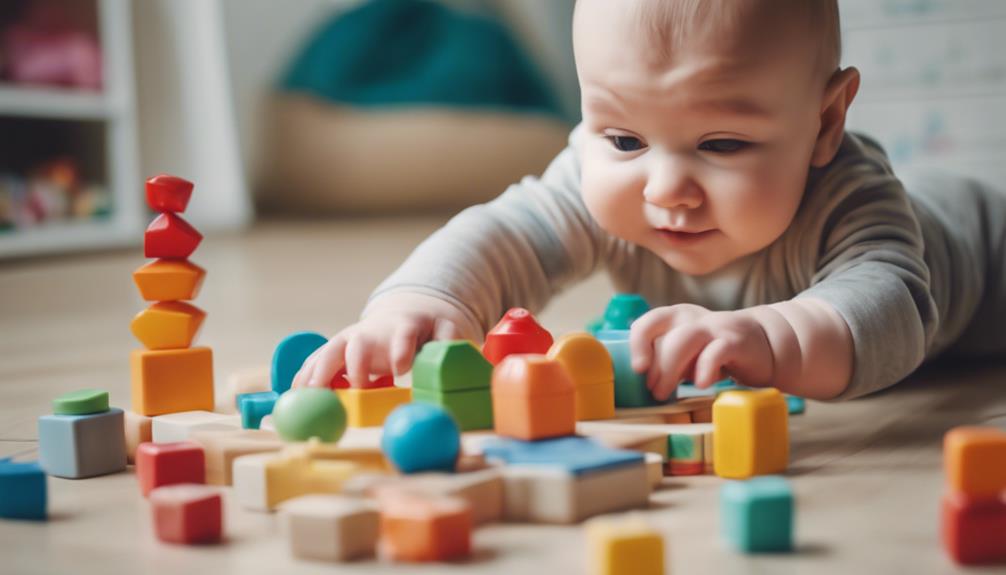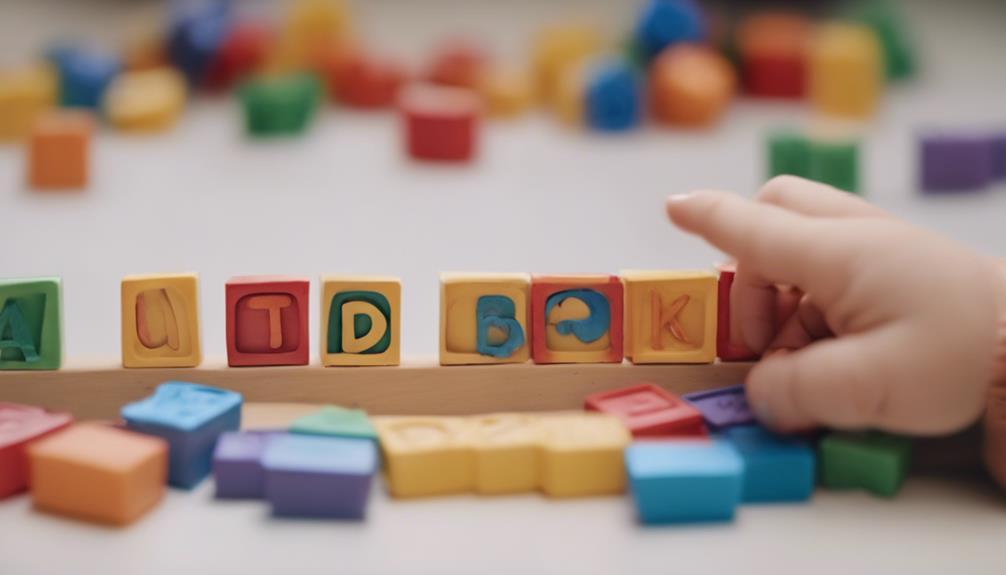For a clever baby, focus on **early language development** by using parentese and narrating activities. Build a solid educational base by introducing them to books and being in language-rich surroundings. Stick to regular routines like setting sleep schedules and **structured play** for growth. Encourage and reward their efforts to boost motivation. Form positive relationships with empathetic language. Improve **cognitive skills** through interactive play and sensory stimulation techniques. Teach emotional skills and participate in interactive play to support **emotional well-being**. Overall, offer **enriching experiences** and celebrate achievements. Learn more ways to nurture your baby’s intelligence and well-being. Delve deeper into fostering your baby’s smarts and happiness.
Key Takeaways
- Engage in parentese communication and interactive play for cognitive development.
- Create language-rich environments with books, storytelling, and rhyming.
- Establish consistent routines for sleep, meals, and playtime to support growth.
- Encourage exploration, problem-solving, and sensory stimulation for intellectual development.
- Provide emotional support, nurturing relationships, and positive reinforcement for overall well-being.
Early Language Development
To enhance your baby's language skills and intellectual development, focus on early language development strategies. Communicating with your baby using a parentese tone can captivate their attention and aid in language development. Narrating daily activities not only promotes early communication but also helps in expanding your baby's vocabulary.
Introducing rhyming into interactions with your baby can assist them in learning language, predicting new words, and engaging in playful language exploration.
Another essential aspect of early language development is pointing. Encouraging your baby to point at objects helps in achieving joint attention and enhancing communication skills. This milestone, typically reached in the first year of life, plays an important role in your baby's language learning journey.
Strong Educational Foundation

Enhancing your baby's cognitive development begins with laying a strong educational foundation through early exposure to books and storytelling. By introducing your child to language-rich environments, you're nurturing their literacy skills and fostering cognitive development.
Engaging in activities like parentese communication and language-based games can spark intellectual growth in your little one's brain. Additionally, interactive play, such as singing nursery rhymes with gestures, contributes not only to cognitive but also emotional development.
To further stimulate your child's intellectual growth, opt for toys that encourage exploration, interaction, and categorization practice. These toys can have a considerable impact on your child's cognitive abilities and problem-solving skills.
Encouraging joint attention during playtime not only strengthens the bond between you and your baby but also supports their social, emotional, and cognitive development. By establishing this educational foundation early on, you're setting the stage for your baby to thrive intellectually and emotionally.
Consistent Routines for Growth
To raise a smart baby, you should establish consistent routines for growth in key areas like:
bedtime and wake-up times,
mealtime and snacks,
playtime and learning activities.
These routines help provide structure and predictability, leading to smoother changes between activities and better behavior regulation.
Bedtime and Wake-Up
Establishing consistent bedtime and wake-up routines for your baby is essential for promoting healthy growth and development. By following a structured bedtime routine, you can help regulate your baby's internal clock, leading to improved sleep quality and supporting their cognitive development. Here are three key points to keep in mind:
- Vital Sleep Schedules:
Babies thrive on routine, so having set bedtime and wake-up times can aid in their cognitive and physical development. Consistency in sleep schedules can enhance brain growth and overall well-being in infants.
- Soothing Bedtime Routine:
Creating a calming routine before bedtime helps signal to your baby that it's time to rest. This can lead to better sleep patterns and a more restful night's sleep, contributing to their overall growth and development.
- Enhanced Sleep Quality:
Adequate sleep is important for babies' brain development. Establishing a bedtime routine can support better sleep quality, ensuring your baby gets the rest they need for optimal growth and learning.
Mealtime and Snacks
Consistent mealtime routines play an essential role in regulating your baby's hunger cues and fostering healthy eating habits essential for growth. Structured meals and snacks create predictability and security for your little one, helping them understand when to expect food.
Offering a variety of healthy foods during these times introduces different flavors and nutrients important for optimal development. Balanced meals contribute to proper growth, cognitive function, and overall well-being in babies.
Incorporating nutritious snacks throughout the day not only supports brain development but also aids in overall growth. By providing healthy snacks, you're giving your baby the necessary fuel to thrive and learn.
Playtime and Learning
Engage your baby in daily structured play sessions to support their cognitive, social, and emotional development. Consistent routines in playtime help your child feel secure and understand expectations, contributing to their overall growth.
Here are three essential ways in which playtime can benefit your baby:
- Enhanced Cognitive Development: Regular play activities can enhance problem-solving skills and creativity in your child. Through interactive play, they can learn to explore, experiment, and discover new things, laying a strong foundation for their cognitive abilities.
- Improved Social Development: Structured play sessions not only provide fun for your baby but also help in fostering social skills. Engaging in interactive play with others promotes bonding and strengthens the parent-child relationship, while also encouraging your child to interact positively with peers.
- Supported Emotional Development: Playtime routines create a sense of stability and predictability for your child, offering them a safe space to express emotions and develop emotional intelligence. This emotional support during play can lead to better self-regulation and overall emotional well-being.
Rewarding Efforts and Encouragement

Rewarding your baby's efforts and providing encouragement can greatly boost their motivation and self-esteem during their developmental journey. Acknowledging the efforts your child puts into learning new skills can have a positive impact on their brain development. By offering praise and positive reinforcement for their attempts, even if they don't succeed at first, you help them build resilience and a growth mindset. Encouraging progress over perfection can help your baby navigate challenges with confidence.
It's essential to focus on your child's efforts rather than just the outcomes. Celebrating small achievements and milestones along the way can instill a sense of accomplishment in your baby and motivate them to keep trying. This approach helps create a supportive environment where your child feels encouraged to explore and learn without fear of failure. Remember, every step forward, no matter how small, is a significant achievement for your little one.
Nurturing Relationships and Respect

Building strong connections with your baby is crucial for their cognitive and social growth. When nurturing relationships and showing respect towards your baby, you're laying the foundation for their overall development. Here's how you can do it:
- Use Positive and Encouraging Language: Children respond well to gentle and kind words. Using positive language helps in building a nurturing environment and fostering a respectful relationship with your baby.
- Model Empathy and Understanding: Children learn by observing. By demonstrating empathy and understanding towards your baby's emotions and needs, you're teaching them the importance of respect and compassion in relationships.
- Read and Interact with Your Child: Reading to your baby and engaging in interactive activities not only enhances their cognitive development but also strengthens the bond between you both. It shows that you value spending time with them and helps in building trust and respect in the relationship.
Cognitive Skills Enhancement

To enhance your baby's cognitive skills, engage in interactive play activities like peekaboo and puppet play. Choose toys that promote exploration, interaction, and categorization practice for best cognitive development.
Encourage physical interactions with the world to foster joint attention and cognitive growth.
Sensory Stimulation Techniques
Engage your baby in sensory-stimulating activities to enhance their cognitive skills from an early age. By incorporating sensory stimulation techniques into your baby's daily routine, you can positively impact their brain development and cognitive abilities.
Here are three ways to create sensory-rich environments for your little one:
- Use age-appropriate toys: Choose toys that stimulate different senses like touch, sight, and sound. These toys can help your baby explore the world around them and develop cognitive functions such as problem-solving and memory.
- Engage in sensory play: Encourage your baby to explore various textures, sounds, and sights through sensory play activities. This hands-on approach can aid in the growth of neural pathways and enhance cognitive development.
- Create sensory-rich environments: Surround your baby with sensory stimuli in their everyday surroundings. This can help them make more brain connections, boosting their cognitive abilities and overall development.
Interactive Play Activities
Introducing interactive play activities can greatly enhance your baby's cognitive skills and development. By engaging in physical interactions like playing peekaboo or using puppets, you give your little one the opportunity to stimulate cognitive development.
Through joint attention and supervised play with toys, your baby can experience validation and cognitive growth. Encouraging experimentation, free learning, and creating positive associations during playtime are key to boosting cognitive skills.
When you interactively play with your baby, you aren't just having fun; you're also laying a strong foundation for their cognitive development. Remember, these simple activities hold great value in shaping your baby's cognitive skills and fostering a positive relationship with learning.
Emotional Well-being Support

Establishing a strong emotional bond with your baby is essential for promoting brain development and cognitive growth. By providing emotional security and responding promptly to your baby's needs, you foster trust and attachment, which are vital for their emotional well-being.
Here are three key ways to support your baby's emotional development and overall well-being:
- Teach Emotional Skills: Educate your toddler about feelings, caring, sharing, and gentle manners to promote emotional and social development.
- Boost Empathy: Enhance emotional regulation by responding with empathy to your baby's emotions, helping create positive brain circuits for emotional well-being.
- Engage in Interactive Play: Participating in interactive play activities and offering emotional support contribute significantly to your baby's emotional security and cognitive growth.
Overall Child Development

To support your baby's overall child development, focus on providing enriching experiences that encourage learning and exploration from an early age. Your baby's brain development thrives on stimulation, so interact, talk, and read to them regularly.
Positive discipline and setting boundaries that cater to your child's needs help children develop emotional regulation skills. Encourage your little one to explore their surroundings and engage in playtime, as these activities are vital for reaching developmental milestones and fostering intellectual growth.
Remember, strong relationships with caring adults play a pivotal role in your baby's cognitive and social development. Celebrate even the smallest achievements, as this boosts your baby's confidence and aids in their learning journey.
Frequently Asked Questions
How Do You Raise a Super Smart Baby?
To raise a super smart baby, engage in interactive play, encourage language development, foster emotional skills, create a nurturing environment, and choose toys matching their stage. Your actions can shape their cognitive growth and overall development from infancy.
What Increases Intelligence in Babies?
To increase intelligence in babies, engage in interactive activities, talk and read often, play stimulating games, provide a nurturing environment, offer nutritious foods, promote physical activity, and guarantee adequate sleep. Your efforts shape their growing minds.
How to Conceive a High IQ Baby?
To conceive a high IQ baby, nurture the seed of intelligence with care. Genetics lay the foundation, while a blend of prenatal care, nutrition, and a stimulating environment can shape their potential. Engage in reading, play, and music for peak development.
What Are the 7 Stages of Brain Development?
Explore the 7 stages of brain development: 0-3 months see rapid synapse formation, 3-6 months focus on motor skills, 6-12 months for language acquisition, 12-24 months boost problem-solving, and 2-4 years enhance memory and social skills.
Conclusion
To sum up, raising a smart baby requires dedication and consistency, much like tending to a delicate garden. By providing a strong educational foundation, nurturing relationships, and supporting overall child development, you can help your little one grow into a bright and capable individual.
Remember, every interaction and experience is an opportunity for learning and growth, so embrace the journey and enjoy watching your baby blossom into their full potential.










